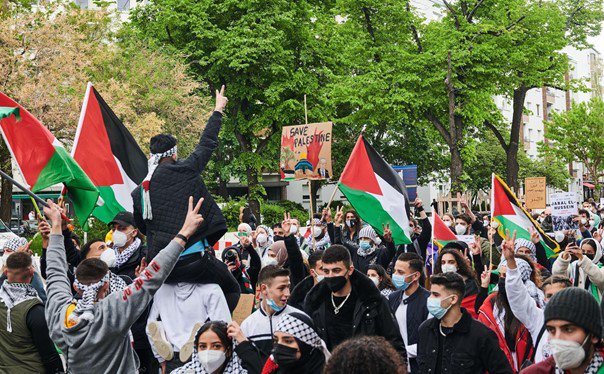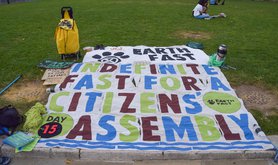
A double standard lies behind German criticism of pro-Palestinian demonstrators
Incidents of antisemitism, wherever they occur, are shocking and wrong. But anti-Jewish hatred was not imported to Germany by immigrants

In the past weeks, after recent events in Palestine/Israel, a number of German politicians, journalists and academics cautioned against antisemitism arising from migrant communities. These claims, made by the likes of Armin Laschet, the head of Germany’s conservative Christian Democratic Union (CDU), imply that today’s antisemitism is a phenomenon that has been mainly imported from abroad, especially by Muslim immigrants.
This assumption is not new, but it has gained traction in the wake of demonstrations against Israel’s 2014 Gaza war and the European ‘refugee crisis’ of 2015-16. Bild, Germany’s leading tabloid, as well as conservative politicians in particular, has been accused of propagating that assumption. In the mainstream media, few critical voices can be heard that challenge this discourse. But the shortcomings of this framing are significant.
After the admission of almost 900,000 refugees into Germany in 2015 and 2016 – mostly coming from Syria, Iraq and Afghanistan – the far-Right Alternative for Germany (AfD) became the third strongest party. Indeed, racism and xenophobia rose enormously during those years. In 2016, for example, there were more than 3,500 attacks on refugees while, in 2020, there were still some 1,600 assaults. In a survey conducted in 2018-19, more than 50% of Germans acceded to statements that were hostile to refugees. But xenophobia and anti-Muslim racism had been thriving long before. In a survey conducted in 2010, for example, 55.4% of Germans agreed with the following statement: “I understand very well that some people think Arabs are displeasing.”
The missing context
It is now widely accepted that right-wing extremism poses the most significant threat to Germany’s democracy. The government is aware of this and has taken a number of measures to curb such extremism. But the surge in xenophobia has simultaneously radicalized the right wings of conservative, liberal and social democratic parties in the Bundestag. They try to increase their own popularity and weaken the AfD by taking a more restrictive stance on refugees and immigration. Widely held resentment of migrants, the rise of the AfD, the upcoming parliamentary elections in 2021 and Germany’s unreserved support for Israel form the backdrop of the current debate.
We’ve got a newsletter for everyone
Whatever you’re interested in, there’s a free openDemocracy newsletter for you.
Some of those who have in recent weeks shown solidarity with Israel and spoken out against antisemitism have themselves been accused of antisemitic acts. Fabrice Ambrosini, for example, the ex-chairman of the CDU’s youth organisation in the Rheinisch-Bergischer district, was recently caught on video seemingly giving a Hitler salute. Though Ambrosini denies this, claiming he only “briefly raised his left arm”, he resigned his post over the incident last month. Others have seemingly promulgated antisemitic conspiracy theories. The former president of the Federal Office for the Protection of the Constitution, Hans-Georg Maaßen, for example, has been accused of using words and phrases such as “globalists” and “the great reset” that are rooted in antisemitism, though it is not clear whether Maaßen knew of their antisemitic connotations.
There is also a more general reluctance to criticise racist and antisemitic attitudes among Germans. Today, within many German households, there is a veil of silence when it comes to the activities of their family members during fascist Germany. Unlike the participants in the German student movement of 1968, who engaged critically with the Nazi past of their contemporaries, discussing the role of parents and grandparents during Nazism has become taboo again among large segments of society. When migrants make anti-Jewish statements, however, the outrage is formidable.
Recently, Germany’s antisemitism commissioner, Felix Klein, accused people with immigrant backgrounds of antisemitism, as well as leftists such as the postcolonial thinker Achille Mbembe (an accusation that Mbembe denies). But Klein remains utterly silent when it comes to the allegations involving those in his own party, such as Ambrosini and Maaßen. Under the guise of accusations of antisemitism, he and like-minded fellows not only flaunt their racist and prejudiced world views, but display double standards. Horst Seehofer, a politician with the CDU’s partner the Christian Social Union (CSU) and Herbert Reul, CDU interior minister of North Rhine-Westphalia, are prime examples. They have proposed legal measures against the recent wave of antisemitism, but at the same time prevent scientific examinations of right-wing extremism and antisemitism within the police.
Discussing the role of relatives during Nazism has become taboo again. But when migrants make anti-Jewish statements the outrage is formidable
It is a disgrace that some synagogues have recently been attacked and that slogans like “fuck the Jews” (“scheiß Jude”) were chanted at anti-Israel demonstrations. Indeed, the conflation of Jewish people and the Israeli government is not only wrong, but also ignores the fact that many Jews themselves are among the Israeli government’s harshest critics. Yet right-wing extremists, many conservatives, some liberals and members of the Green Party and even a few leftists have joined together in criticising immigration. Some, such as the historian Michael Wolffsohn and the Left Party (Die Linke) politician Gregor Gysi have condemned “Islamic antisemitism”. Others, such as the former Federal Intelligence Service president Gerhard Schindler, the CSU politicians Joachim Herrmann, Alexander Dobrindt and Markus Söder, the Die Linke Osnabrück branch and various AfD members, have demanded faster deportation of “Muslim antisemites”. Others still, such as the Green Party politician Cem Özdemir and CDU politician, Mathias Middelberg, are asking for more restrictive conditions for obtaining German citizenship after anti-Jewish incidents in pro=Palestinian demonstrations .
At a Solidarity with Israel rally on 20 May, Özdemir even quoted former Israeli prime minister Golda Meir’s statement that “peace will come when the Arabs love their children more than they hate us”. It brought him thundering applause from the crowd. All this does not merely give precedence to “migrant” forms of anti-Jewish hatred, but – under the cloak of fear of antisemitism – serves as a pretext to delegitimise any criticism of Israel and to encourage anti-Muslim, anti-Palestinian and anti-immigrant hostility.
Taking a larger and longer view
There have been far fewer persecutions against Jewish people in the world of Islam than in Europe. In the so-called Near- and Middle East, there are no historical parallels to the outgrowth of German antisemitism and the Holocaust. Moreover, no empirical data exists showing that antisemitism has primarily crept into Germany from abroad. On the contrary, among the 2,351 recorded antisemitic crimes in 2020, more than 90% can be characterised neither as being religious nor “foreign”. They were perpetrated by predominantly white adherents of right-wing ideologies.
Those Germans who invoke the failed integration of Muslims should take a look in the mirror before pointing fingers at others. The aftermath of the Nazi dictatorship and the resurgence of fascist tendencies within major segments of German society are surely far more worrying than the anti-Jewishness of migrant populations, who were not responsible for the racist and antisemitic murders in Hanau or Halle, for instance.
What is kept silent
Almost every week, we are greeted with news of racism in German society. There are incidents of racism within the German police, armed forces and the Office for the Protection of the Constitution. There is evidence that people of colour are subject to institutional discrimination. The police officers suspected of being responsible for the death of Oury Jalloh, an immigrant from Sierra Leone who burned to death in a custody cell in 2005, have never been sentenced, while more than 180 other people appear to have died as a result of racist police violence since 1990.
More recently, there is the fact that Germany, as part of the EU, is responsible for the deaths of thousands of refugees in the Mediterranean, while the CDU, the Green Party and the Social Democrats (SPD) all oppose the release of files relating to the neo-Nazi terrorist movement National Socialist Underground and its contact with German intelligence services. Police officers at recent pro-Palestine demonstrations, meanwhile, have used brutal force, arbitrary violence and racial profiling against young activists. And that’s not to mention that 248 Palestinians, including 66 children, have died in Gaza as a result of air strikes by Israel, whose military equipment is partly supplied by Germany (as opposed to 13 people in Israel killed by Hamas rockets).
Nonetheless, Germany’s mainstream media and political establishment prefer to demonise and portray marginalised non-white youth, activists and refugees as anti-Jewish. To paraphrase Jacques Derrida: what is kept silent, ignored or neglected often reveals more about a person, society and the system than the things that have actually been said, undertaken and embarked upon.
Read more
Get our weekly email




Comments
We encourage anyone to comment, please consult the oD commenting guidelines if you have any questions.